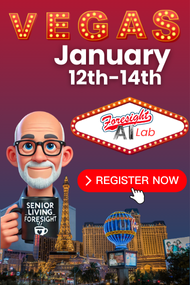By Jack Cumming
Over last weekend, Formula 1 came to America, rivalry football dominated our TV screens, and China seemed friendlier than usual. But the story that dominated many imaginations was artificial intelligence and the firing of OpenAI’s CEO, Sam Altman by the company’s board. The story was of purists and pragmatists.
Not-for-Profit Superiority?
The Formula 1 race seemed to have fewer twists and turns than did the OpenAI saga. Moreover, it proved that human personalities, board personalities, still dominate something that is both as feared and welcomed as is AI. While the previously six-member OpenAI board was clashing over nonprofit values versus extending AI benefits to more people, LinkedIn hosted a more deliberative conversation about a similar question for senior living.
On LinkedIn, Dan Levitt, a gerontologist and CEO of Canada’s Kin Village, posted, “The big question: Does not-for-profit senior living matter?” Many long-term denizens of senior living were horrified.
Cheryl Harding, PhD, was quick to voice the conventional industry view, “Yes! Not-for-profit aging services is important for setting the bar on quality!”
When one peels back the carefully worded OpenAI statements on the turmoil there, the issue for both industries seems the same. Some leaders believe that something good, like AI or senior living, should be made available to as many people as possible. That requires capital and enough profit to attract that capital.
Others believe that the pursuit of profit detracts from mission. Of course, that’s just a belief and not a demonstrable tautology. The OpenAI mission is “building safe and beneficial artificial general intelligence for the benefit of humanity.” The senior living analog might be “building safe and beneficial senior living for the benefit of humanity.”
Too Commercial?
Sam Altman’s sin, in the eyes of the four board members who voted him out, seems to have been that he was too commercial, while they favored the safe haven of science without the “dirty” business of commercialization and without any risk from widespread usage. They seemed to fear that widespread usage with a flawed iteration was contrary to the nonprofit mission.
Have we shared that OpenAI is tax-exempt under IRS 501(c)(3)? It is, just as are many senior living tax-exempt businesses.
The striking difference is that the OpenAI brouhaha broke out into public scrutiny, while the sedate senior living conversation on LinkedIn is largely confined to a small group of industry insiders. Perhaps because of the public scrutiny, the pace of the OpenAI conversation moved much more quickly than has the pace of conversation around the same question for senior living.
Quick Turnaround
By Sunday, just two days after the shocking news of Sam Altman’s ouster from OpenAI, and brainy Greg Brockman’s decision to leave with Sam, the New York Times was headlining, “Sam Altman Is Said to Be Discussing Return to OpenAI With Company’s Board.” That leads one to want to ask, “How was your weekend, Mr. Altman?” Apparently, no AI robot is as yet ready to take over the CEO slot, even for an AI company. Reality conquers fear.
Then, waking up on Monday morning, we learned that Sam Altman will not be returning to OpenAI. Instead, he is going to head Microsoft’s effort to bring the benefits of AI to humanity. That wouldn’t have been my choice. Microsoft has always seemed more bent on proprietary advantage than on the common good and on business protection rather than on consumer value. It will be fascinating to see how that plays out.
No sooner did we get that news than we learned that 500 of OpenAI’s 700 employees petitioned the board to bring Sam Altman back, or they would, they threatened, join him at Microsoft. The board, though, fumbled Altman’s return, so OpenAI’s future now looks dark. OpenAI is a nonprofit, and senior living industry executives know well that it’s hard for a stronger player to take over a nonprofit.
Still, it appears that Microsoft’s CEO, Satya Nadella, seized the opportunity and succeeded in attracting OpenAI’s talent without having to buy the company. That means that the new Microsoft entity will be able to have the talent without corporate bloat. Microsoft already has the rights to most of OpenAI’s development output. Wow.
In another curious twist, Sam Altman had tweeted to his former colleagues, “I love you all.” The apparent leader of the purist faction resulting in his ouster is Ilya Sutskever, board member and OpenAI’s chief scientist. Conspiracists were quick to note that the initial letters of “I love you all” spell Ilya. Serendipity or roman à clef?
That seemed matched by Seth Godin’s wisdom, also posted on Sunday:
Somewhere, there is the ideal soil for growing mangoes. Or, the best possible wave for surfing. Or, the most romantic sunset for a proposal.
But, it’s not right here, and it’s not right now.
Our success has a lot to do with how we dance with conditions that aren’t quite perfect.
To see Silicon Sam in suit and tie with students at Cambridge University, click here. Click here for a paper on corporate bloat and how to cope with it.










